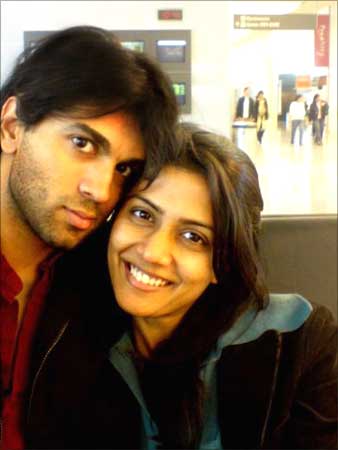 If you thought the hurdles to gainful employment for qualified professionals was a fringe phenomenon, think again.
If you thought the hurdles to gainful employment for qualified professionals was a fringe phenomenon, think again.
Samvita Padukone, 27, studied engineering and finance in Singapore. She married famous Google engineer Sanjay Mavinkurve, 28, last year in Mumbai , and the couple lives in Toronto.
Mavinkurve, who did his masters in computer engineering from Harvard University, travels to Google's headquarters once every two weeks and one week he works out of the Internet giant's office in Toronto.
The New York Times recently ran a story on him, calling him Google's star product designer who is the team leader working on digital mapping and trying to how to improve "downloading on mobile phone maps and other information."
He doesn't have his green card yet. So, he's a landed immigrant in Toronto, as is his wife. Mavinkurve has an H-1 visa that allows him to work in the United States, but he wouldn't take an H-4 (dependent) visa for his wife, because that would prevent her from working.
But Padukone's problems did not end in the US. She says her foreign qualifications are such a hurdle that Canadian companies wouldn't even acknowledge when she would mail them her resume.
"I started wondering why it was so," Padukone says, "as I was working for the DBS, the biggest investment bank in Singapore. I found out that Canadian companies need Canadian (work) experience.
"My husband was working in the US and I was in Singapore," she continues, "so we decided to live in Toronto, a place where both of us could work together. I couldn't work in the US because his H-1 visa does not allow me to work there."
She lived in Singapore for nine years, and worked for DBS for three years. But why a banking job after doing an electrical engineering degree with minor in business?
"I found the people and their personality in the banking industry, and in business more suited to my thinking," she explains. "Because of my experience with DBS in Singapore, I tried to get a job in Toronto in merchant banking. Sadly, when I came here last year, that sector was in trouble because Lehman Brothers had collapsed. A lot of people were coming here from the Wall Street to work, people who had so much more experience, and I didn't find any job in merchant banking. "
She started applying for jobs that required some kind of financial background. "But over and over again I heard the companies needed Canadian (work) experience," says. She found it "quite unfortunate and depressing - it was not like I came from an underdeveloped country and my degree was completely different or for that matter my work experience!"
"People," she continued, "would say, 'You have to start here at the entry level.' The entry level means starting as an unskilled worker - any job that will give an hourly wage."
In Toronto, to address this problem of Canadian work experience, there is a bridge-building programme that helps professional immigrants.
"I enrolled myself in that programme but I was lucky to ultimately find a job with Canadian Tire," Padukone says. "In Singapore I used to read that Canada is welcoming professional immigrants but once I landed here I realised it was just sound bytes. You come here expecting that there are lots of opportunities but it (the experience) comes to you as a rude shock literally once you are in the country. You can't find a job without a Canadian experience. You get into this vicious cycle."
The Toronto Star recently ran a front-page story about how difficult it has become for immigrants to find a job in this country despite good education and work experience. The article talked about Divesh Gupta, 24, who studied at the University of Mumbai before moving to Toronto to do a postgraduate diploma in strategic relationship marketing at George Brown College. He is now reportedly mailing 25 to 30 resumes a week and 'living hand to mouth.'
0 comments:
Post a Comment